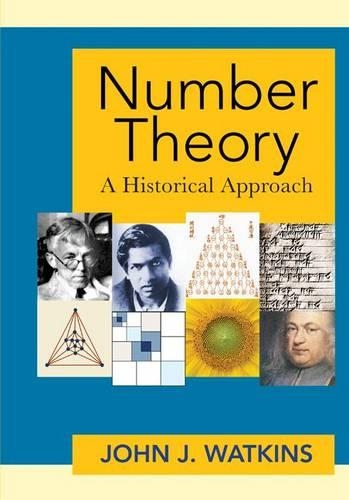
Number Theory: A Historical Approach
(Hardback)
Publishing Details
Number Theory: A Historical Approach
By (Author) John J. Watkins
Princeton University Press
Princeton University Press
5th March 2014
United States
Classifications
Tertiary Education
Non Fiction
512.7
Physical Properties
Hardback
592
Width 178mm, Height 254mm
1162g
Description
The natural numbers have been studied for thousands of years, yet most undergraduate textbooks present number theory as a long list of theorems with little mention of how these results were discovered or why they are important. This book emphasizes the historical development of number theory, describing methods, theorems, and proofs in the contexts in which they originated, and providing an accessible introduction to one of the most fascinating subjects in mathematics. Written in an informal style by an award-winning teacher, Number Theory covers prime numbers, Fibonacci numbers, and a host of other essential topics in number theory, while also telling the stories of the great mathematicians behind these developments, including Euclid, Carl Friedrich Gauss, and Sophie Germain. This one-of-a-kind introductory textbook features an extensive set of problems that enable students to actively reinforce and extend their understanding of the material, as well as fully worked solutions for many of these problems. It also includes helpful hints for when students are unsure of how to get started on a given problem. * Uses a unique historical approach to teaching number theory * Features numerous problems, helpful hints, and fully worked solutions * Discusses fun topics like Pythagorean tuning in music, Sudoku puzzles, and arithmetic progressions of primes * Includes an introduction to Sage, an easy-to-learn yet powerful open-source mathematics software package * Ideal for undergraduate mathematics majors as well as non-math majors * Digital solutions manual (available only to professors)
Reviews
"An excellent contribution to the list of elementary number theory textbooks. Number theory, it is true, has as rich a history as any branch of mathematics, and Watkins has done terrific work in integrating the stories of the people behind this subject with the traditional topics of elementary number theory. There is more than enough material here for a one-semester course, and while this is standard for textbooks at this level, the added historical and biographical material--which cover mathematical developments and people well into the 20th century--are well worth the increased weight of the text."--Mark Bollman, MAA Reviews
Author Bio
John J. Watkins is professor emeritus of mathematics at Colorado College. His books include "Across the Board: The Mathematics of Chessboard Problems" (Princeton), "Topics in Commutative Ring Theory" (Princeton), "Graphs: An Introductory Approach", and "Combinatorics: Ancient and Modern".
